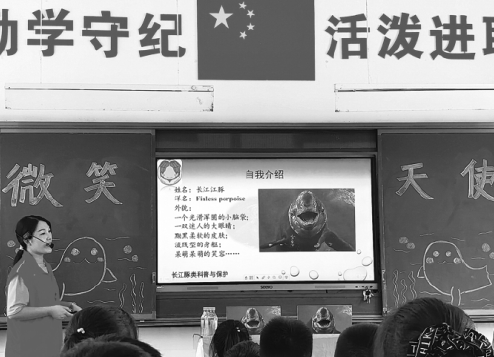A career filled with porpoise
Young woman dedicates her time to raising awareness about the need to protect Yangtze's 'smiling angels', Cheng Yuezhu reports.

The waters of the Yangtze River are home to the critically endangered Yangtze finless porpoise, known locally as the "smiling angel" thanks to its upwardly extending mouth, which gives it a seemingly cheery expression.
Currently, however, there is little for the creature to smile about. With only around 1,000 of the porpoises left, the government, researchers and volunteers are working hard to preserve the species. Tan Ge, secretary of Yueyang Porpoise Protection Association in Hunan province, is one of them.
Born in 1991, Tan grew up in Hunan's Yueyang, a city beside Dongting Lake, which is linked to the Yangtze River. However, it wasn't until she started working that she learned about this precious aquatic animal, and that a group of volunteers was working to protect them.
"At first, I started donating food and protective gear like hats and gloves. I just wanted to do everything I could to relieve a little of their stress," Tan says.
As she had more frequent contact with the volunteers, she developed a better understanding of the finless porpoise and realized that perhaps a lot of locals, like herself, had little knowledge of the animal. So, in 2018, she joined the association.
Since then, she has been working on the front line of ecological protection, traveling by boat on Dongting Lake and Xiangjiang River, a tributary of the Yangtze. She has participated in more than 350 field trips to tackle illegal fishing, more than 100 of which took place at night, saving not only finless porpoises, but also other wildlife species in the area.
Once, when Tan and a group of volunteers went patrolling Dongting Lake by boat, they noticed a set of large-scale illegal fish traps covering nearly 0.67 hectares of the lake. Such traps are designed to capture all aquatic animals passing through them and, as such, posed a serious ecological threat.
It was a particularly windy day. The patrol team members contacted the local fishery authorities, slowly approached the nets, and released more than 500 kilograms of fish of varied species. Rain started pouring down just before they were about to head to their next destination, and the team had to wait where they were, as it was unsafe for the small boat to move.
"The heavy rain continued for 20 minutes and everyone was completely drenched, but my determination-and, I believe, that of everyone else in the boatto protect the porpoises and the waters they inhabit grew even stronger," Tan says of the experience.
The association formed a team called "saving the smiles of finless porpoises", which teaches environmental protection at organizations, factories, schools and communities, guides student societies from around the country on field trips and hosts writing and painting contests to raise awareness about the animal.
She has led more than 100 educational field trips-from primary school level to university students-in the Dongting Lake area, informing them about the finless porpoise or helping them research the local ecology.
He Jiujiu, a local middle school teacher who has taken students on field trips with Tan, says: "She has made nonprofit ecological preservation her vocation and fervently devoted herself to it. She loves the finless porpoise and has been an active protector of the species, hoping to raise public awareness, concern and love for the animal. I find her remarkable."
Tan says preservation of the finless porpoise is key to protecting the whole ecosystem of Dongting Lake and the greater Yangtze River water network.
"We aim to inform and influence more young people with our determination to protect the finless porpoise, so as to raise society's awareness about ecological protection and finless porpoise preservation," Tan says.
"In the future, I will continue to build our team and maximize its efficiency. As I have engaged in this career, I will work with energy, and hope to steadily improve my ability and grow with this public welfare cause."

































